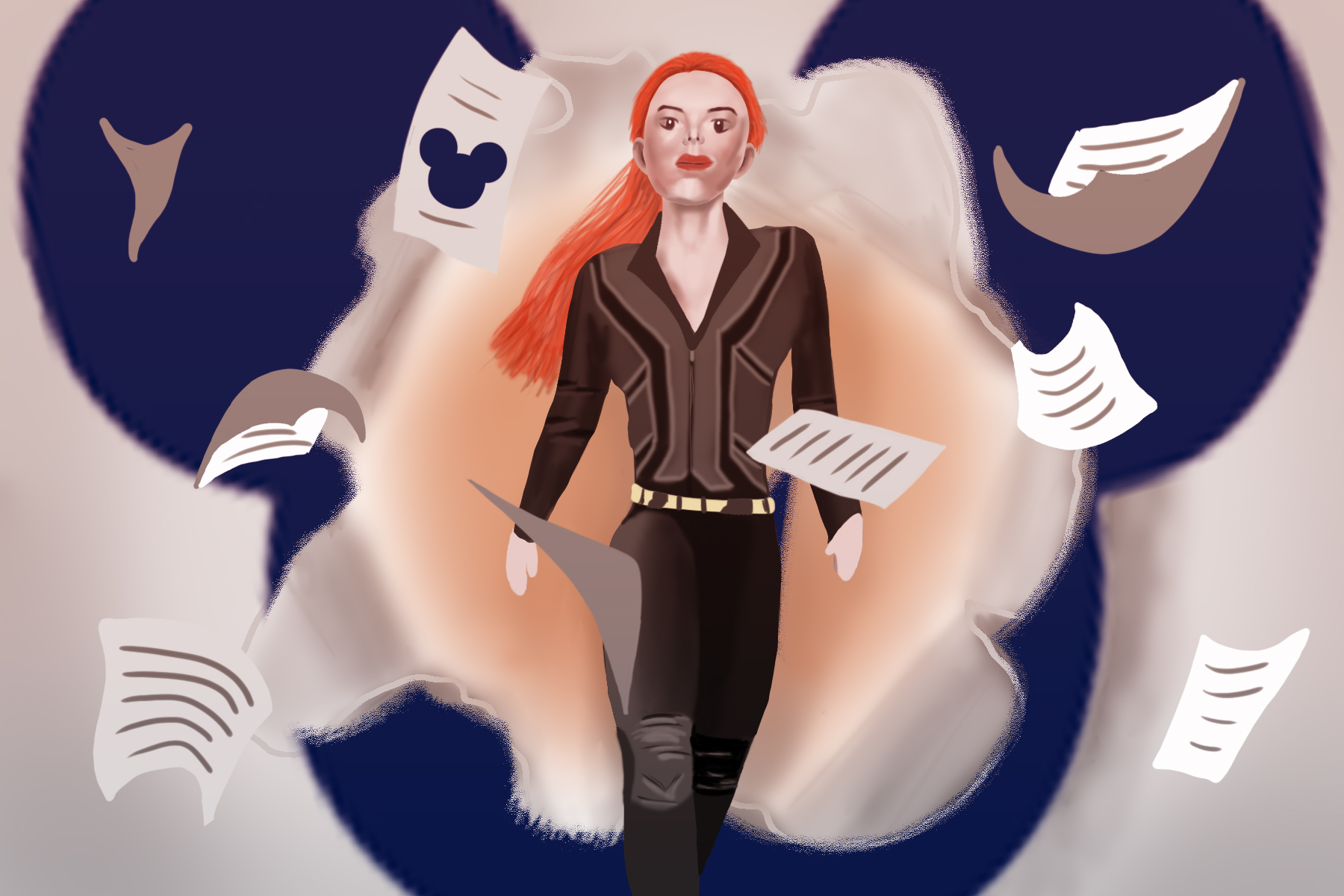Critically acclaimed and sometimes controversial actress Scarlett Johansson turned heads late last July when she filed a lawsuit against the mass media giant Disney for a breach of contract on Marvel Studios’ “Black Widow.” The lawsuit concerns the original contract intent negotiations that outlined Johansson’s back-end compensation from box office ticket returns; this original contract did not include a streaming release or a day-and-date. The lawsuit also claims Disney broke the Covenant of Good Faith and Fair Dealing within her original contract.
Johansson debuted as Black Widow in 2010’s “Iron Man 2” and concluded her contract with the superhero’s first solo film this past July. After working with Marvel Studios for so long, many didn’t anticipate any bad blood between the actress and Disney, Marvel’s parent company, especially since it had already been reported back in June that the pair were working on a Tower of Terror project with Johansson as the producer. On the surface, this lawsuit may seem silly for someone who already has millions. However, it has significant implications for how Hollywood writes contracts as the industry evolves during the pandemic.
Johansson’s Natasha Romanoff, aka Black Widow, has been a stabilizing force in the MCU’s ever-changing ensemble lineup for roughly 10 years. Her character growth alone is something to be applauded; she essentially began as a glorified sexy bimbo, but by the end she had rightly earned her solo film (even if it was overdue) as an established powerful female hero. It’s unfortunate that her final film was a prequel after her character had already died in the current continuity, which reduced the stakes of film but still elicited excitement among fans of the superhero. Intended to debut theatrically back in May 2020, “Black Widow” would have started Phase Four. However, with blockbusters being postponed left and right as the pandemic worsened, studios started taking risks.
Late last year, Warner Bros. shocked everyone and pissed off the other NATO by announcing their film slate through 2021 for HBO Max, with a day-and-date release for no extra charge. Understandably, directors and actors were upset, which ultimately led to Warner Bros. paying out an extra $200 million to various stars.
Disney+’s Premier Access used a similar day-and-date release model in September 2020 for its live-action “Mulan” — for an extra $30 on top of the subscription fee, audiences could watch the film via streaming. The film and its release structure received mixed reviews, leaving viewers and critics to conclude that the Premier Access model would work for mid-grade films but not for blockbusters. Therefore, no one thought “Black Widow” would even be considered for a same-day theater and streaming release date. However, the film had been delayed multiple times, so out of desperation Disney announced its dual release for July 9. Because of the continuity within the MCU, every time the film was delayed, so were other projects, all to a point where the majority of Phase Four’s release plan had to be rescheduled and projects even rewritten.
Johansson’s reasoning behind her lawsuit evokes the same rationale as Taylor Swift’s suit against Spotify. The lawsuit confronts the way an industry (Hollywood) is changing (streaming) and how proprietors (Disney) of ancillary products thought they could get away with keeping a larger profit (Premier Access) without paying the artist for their work. During the pandemic, we have seen an immense growth for streaming services from 2019 — upwards of $13 billion in revenue. However, the discussion about how actors will get paid for their film’s streaming release while also in theaters has been seldom discussed because it’s just so new, especially on this scale.
Back in the ‘90s, Jim Carrey transformed the industry when he fought for and earned a large salary for the dark comedy hit “The Cable Guy.” A few years later, Tom Cruise earned a huge payday for “Mission Impossible” with a back-end deal, a contract agreement that states a certain percentage of a film’s box office return will be paid out after the actor has received their initial salary. At first seen as a gamble, this has become regular practice for blockbusters. Robert Downey Jr. was paid $20 million with an 8% back-end deal for “Avenger’s Endgame,” which made $700 million in domestic box office returns, leaving him with an incredible $75 million overall payout. We don’t know the exact percentage in Johansson’s contract, but knowing the above, the accusation that Premier Access lost the actress money seems much more viable.
The film was a success, grossing $100 million in its first six days domestically — the first film to do so during the pandemic. Disney, who usually keeps its streaming numbers secret, boasted publicly (stupidly) of the film’s Premier Access success, leading it to garner only $60 million globally during opening weekend. The following weekend, tabloids blasted the film for its box office haul dropping 61%, but that should be obvious with the dual release. Forbes, with insights from sources close to Johansson, estimated the actress’s lost earnings at $50 million.
Franchises like the MCU are aware of the clout household names bring to their company, so keeping them happy is a must; President Kevin Feige was reportedly upset over this ordeal, along with other issues faced by new Disney CEO Bob Chapek. Disney responded to Johansson’s suit, stating defensively that it was “especially sad and distressing in its callous disregard for the horrific and prolonged global effects of the COVID-19 pandemic.” Disney has also cut all ties with Johansson for the Tower of Terror project. This, along with the bitterness of their official response to the lawsuit, was met with immediate backlash, even from the president of SAG-AFTRA, who called Disney out for its blatantly misogynistic response.
We’ll see the outcome in court. However, fingers are crossed as rumors percolate that Emma Stone is rethinking a “Cruella” sequel and other actors are reportedly considering suits as well. Perhaps the legacy of “Black Widow” will be remembered for something unrelated to the MCU.

















